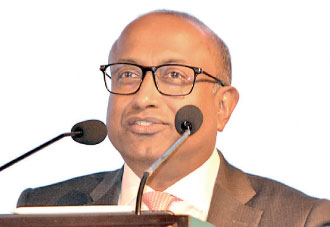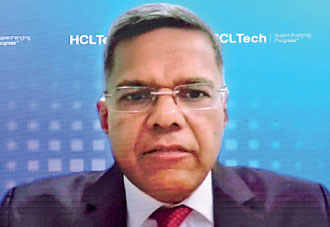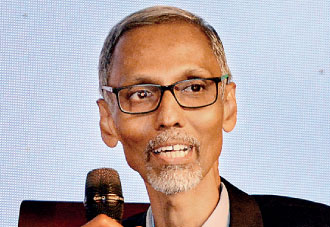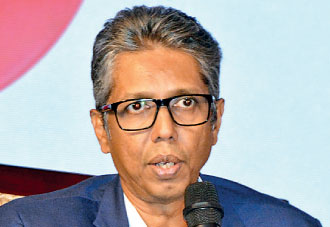Monday Feb 16, 2026
Monday Feb 16, 2026
Monday, 29 July 2024 01:52 - - {{hitsCtrl.values.hits}}

 In today’s fast-paced world, the skills required are constantly evolving. We must invest in education and training programs that equip individuals with the necessary skills to thrive in the IT sector. Talented individuals, successful entrepreneurs, and business people want to be based where they are treated the best. Sri Lanka has the potential to attract top talent by leveraging its strategic location and educated, English-speaking population – Henley & Partners MD Rory McDaid
In today’s fast-paced world, the skills required are constantly evolving. We must invest in education and training programs that equip individuals with the necessary skills to thrive in the IT sector. Talented individuals, successful entrepreneurs, and business people want to be based where they are treated the best. Sri Lanka has the potential to attract top talent by leveraging its strategic location and educated, English-speaking population – Henley & Partners MD Rory McDaid

 Every industry today is a tech industry, and countries with stronger human capital attract foreign investment, foster entrepreneurship, and become hubs for innovation. Continuous learning and adaptability in the face of rapid technological changes are crucial for future success – NASSCOM Chairman Rajesh Nambiar
Every industry today is a tech industry, and countries with stronger human capital attract foreign investment, foster entrepreneurship, and become hubs for innovation. Continuous learning and adaptability in the face of rapid technological changes are crucial for future success – NASSCOM Chairman Rajesh Nambiar

 Sri Lankan companies must focus on delivering value through digital transformation solutions rather than just individual IT services. By evolving our branding strategy from ‘Sri Lanka inside’ to ‘created in Sri Lanka,’ we can position the nation at the forefront of global IT solutions and innovation – Axiata Group Bhd Telecommunications Business Group CEO Dr. Hans Wijayasuriya
Sri Lankan companies must focus on delivering value through digital transformation solutions rather than just individual IT services. By evolving our branding strategy from ‘Sri Lanka inside’ to ‘created in Sri Lanka,’ we can position the nation at the forefront of global IT solutions and innovation – Axiata Group Bhd Telecommunications Business Group CEO Dr. Hans Wijayasuriya

 No country can build its human capital indigenously. Sri Lanka needs to open its borders to foreign workers and address the talent shortage exacerbated by emigration. Investment follows talent, and focusing on both developing local talent and attracting international expertise is essential – 99x Founder Mano Sekaram
No country can build its human capital indigenously. Sri Lanka needs to open its borders to foreign workers and address the talent shortage exacerbated by emigration. Investment follows talent, and focusing on both developing local talent and attracting international expertise is essential – 99x Founder Mano Sekaram

 We need to see a continuation of resilience, skills, talent, and adaptability. The importance of education aligning with industry needs, especially in emerging technologies like AI and ESG, cannot be overstated. Sri Lanka’s talent is integral to our global operations – IFS Chief Human Resources Officer Kate Bishop
We need to see a continuation of resilience, skills, talent, and adaptability. The importance of education aligning with industry needs, especially in emerging technologies like AI and ESG, cannot be overstated. Sri Lanka’s talent is integral to our global operations – IFS Chief Human Resources Officer Kate Bishop

 There is always a gap between what the education system is training our future employable population for and what the industry actually needs. Integrating industry-relevant content into educational programs and leveraging educational technologies will significantly shorten the transition period for new employees, preparing them better for real-world roles – HCL Technologies Corporate Functions COO Rahul Singh
There is always a gap between what the education system is training our future employable population for and what the industry actually needs. Integrating industry-relevant content into educational programs and leveraging educational technologies will significantly shorten the transition period for new employees, preparing them better for real-world roles – HCL Technologies Corporate Functions COO Rahul Singh

 Talent retention starts at the company level with effective resource management and expansion opportunities. With macroeconomic stability and investments in infrastructure, healthcare, and education, Sri Lanka can retain talent and ensure a continuous pipeline of young professionals – BCS Technology International Chief Transformation Officer Uditha Ranaweera
Talent retention starts at the company level with effective resource management and expansion opportunities. With macroeconomic stability and investments in infrastructure, healthcare, and education, Sri Lanka can retain talent and ensure a continuous pipeline of young professionals – BCS Technology International Chief Transformation Officer Uditha Ranaweera

 The fundamental problem lies in the disconnect between the competencies businesses require and what colleges and universities train. Adopting a model where businesses define necessary competencies, and training providers tailor their programs accordingly, will bridge this gap – University of Buckingham Faculty of Computing, Law, and Psychology Dean Professor Harin Sellahewa
The fundamental problem lies in the disconnect between the competencies businesses require and what colleges and universities train. Adopting a model where businesses define necessary competencies, and training providers tailor their programs accordingly, will bridge this gap – University of Buckingham Faculty of Computing, Law, and Psychology Dean Professor Harin Sellahewa

 To leverage digital transformation effectively, we need collaboration among government, key economic sectors, and citizens. Addressing systemic issues, building digital skills across all sectors, and developing a clear vision for a digital Sri Lanka are essential for driving the country’s digital agenda forward – Talliance Past Chair and SLASSCOM Director Ashique M. Ali
To leverage digital transformation effectively, we need collaboration among government, key economic sectors, and citizens. Addressing systemic issues, building digital skills across all sectors, and developing a clear vision for a digital Sri Lanka are essential for driving the country’s digital agenda forward – Talliance Past Chair and SLASSCOM Director Ashique M. Ali

 Sri Lanka must establish a leadership-driven cybersecurity agency to guide companies on essential security measures and protect critical infrastructure. With the high demand for cybersecurity talent, there is potential for Sri Lanka to become a global exporter of cybersecurity expertise – Scybers Co-Founder and President Madu Rathnayake
Sri Lanka must establish a leadership-driven cybersecurity agency to guide companies on essential security measures and protect critical infrastructure. With the high demand for cybersecurity talent, there is potential for Sri Lanka to become a global exporter of cybersecurity expertise – Scybers Co-Founder and President Madu Rathnayake
|
Infomate CEO Jehan Perinpanayagam (Moderator) |
By Michelle Therese Alles
A significant focus was placed on the Information Technology Pillar at the Human Capital Summit 2024 held recently, with a distinguished panel of speakers who shed light on various facets of the IT sector, its current challenges, and its future potential. They highlighted the sector’s transformative power, the urgent need for a skilled and adaptable workforce, and the importance of fostering an inclusive and diverse environment as the world becomes more interconnected and technology-driven.
Henley & Partners MD Rory McDaid, who served as both a presenter and a panellist, emphasised the critical need for a skilled and adaptable workforce and the importance of continuous learning and upskilling. “In today’s fast-paced world, the skills required are constantly evolving. We must invest in education and training programs that equip individuals with the necessary skills to thrive in the IT sector,” he asserted.
McDaid highlighted the strategic initiatives of various nations to attract top talent which aims to enhance the country’s innovation and tech economies. “Talented individuals, successful entrepreneurs, and business people want to be based where they are treated the best,” he explained. He also pointed out the potential for Sri Lanka to implement a similar program, leveraging its strategic location and educated, English-speaking population to attract highly skilled individuals and boost foreign direct investment.
In his keynote address, HCL Technologies Corporate Functions Chief Operating Officer Rahul Singh emphasised the critical need to align educational curricula with industry requirements to bridge the gap between academic training and practical job skills. “There is always a gap between what the education system is training our future employable population for and what the industry actually needs,” he stated. Singh highlighted the importance of collaborative efforts between industry and educational institutions to ensure that graduates are better prepared to meet the demands of the rapidly evolving IT services sector.
Integrating industry-relevant content
He proposed that integrating industry-relevant content into educational programs and providing incentives for training initiatives could significantly shorten the transition period for new employees, making them deployable in real-world roles more quickly.
He also advocated for the increased use of educational technologies, or edtech, to facilitate self-paced and flexible learning opportunities. “Delivering education through new means, such as access to training technologies, becomes very critical so that prospective employees can self-learn at their own time and pace,” he explained. He pointed out that such approaches not only make training more accessible, but also allow the industry to receive a more prepared workforce capable of quickly adapting to work roles. By leveraging these innovative educational tools, the IT sector can ensure a continuous supply of skilled talent ready to meet the industry’s evolving needs.
NASSCOM Chairman Rajesh Nambiar delivered a compelling keynote address emphasising the critical role of digital human capital in shaping the future. He highlighted that technology discontinuity has always created some level of disruption in human capital, a phenomenon he referred to as a ‘fundamental reality’. He elaborated on how the digital era is transforming industries and economies globally, stating, “Every industry today is a tech industry.” He underscored the point by mentioning that even traditional sectors like healthcare and financial services now consider themselves technology industries due to their reliance on digital advancements.
Nambiar also discussed the importance of countries investing in developing their digital human capital to stay competitive in the global economy. He noted, “Countries with stronger human capital attract foreign investment, foster entrepreneurship, and become hubs for innovation.” Using India as an example, he explained how digital public infrastructure has significantly contributed to economic growth and job creation. Nambiar concluded by stressing the need for continuous learning and adaptability in the face of rapid technological changes, suggesting that ‘learnability’ might be the most crucial skill for future success.
The moderator, Infomate Chief Executive Officer, and SLASSCOM and ACCA Past Chairman Jehan Perinpanayagam began by addressing IFS Chief Human Resources Officer Kate Bishop, highlighting IFS’s long-standing relationship with Sri Lanka and its plans for expansion. He pointed out that IFS has been a significant user of Sri Lankan talent for the past 25 years and is looking to leverage this talent further to achieve its growth targets. He then asked, “What skills and soft skills would you like to see, and what must we do to help you grow in Sri Lanka?”
Bishop emphasised the importance of soft skills and adaptability in the workforce. She noted, “What we need to see moving forward is a continuation of that amazing resilience that we’ve had over those 25 years. The skills, the talent, the collaboration, the adaptability—all of those soft skills.” She also highlighted the critical role of education in aligning with industry needs, particularly in emerging technologies like AI and ESG (Environmental, Social, and Governance). She pointed out that 80% of IFS’s global product development is done in Sri Lanka, underscoring the importance of local talent in their global operations.
Axiata Group Bhd Executive Director and Telecommunications Business Group Chief Executive Officer Dr. Hans Wijayasuriya addressed the strategic positioning of Sri Lankan IT companies in the global market. He emphasised the importance of continuously adapting to technological advancements and competitive dynamics, asserting, “The buyer is not going out to buy software; they’re looking at transformation.” Wijayasuriya highlighted the need for Sri Lankan companies to focus on delivering value through digital transformation solutions rather than just individual IT services.
Closer collaboration between industry and technology sectors
He pointed out the country’s strong intellectual capital and the necessity of consolidating this knowledge to develop a cross-sectoral skill set. “Sri Lanka has no deficit in intellectual capital,” he remarked, advocating for closer collaboration between industry and technology sectors and a branding strategy that evolves from ‘Sri Lanka inside’ to ‘created in Sri Lanka’. This, he concluded, would position the nation at the forefront of global IT solutions and innovation.
99x Founder Mano Sekaram addressed the pressing challenges facing Sri Lanka’s human resources and talent pipeline during the panel discussion. He emphasised the rapid changes in technology, noting that areas like AI, machine learning, data science, and cybersecurity require constant upskilling. Sekaram highlighted the country’s talent shortage, exacerbated by emigration, and stressed the importance of opening borders to foreign workers.
“No country can build its human capital indigenously,” he stated, underscoring the necessity for Sri Lanka to attract international talent. He also pointed out that investment follows talent, indicating that without addressing these issues, Sri Lanka risks falling behind. “If you win the battle for talent, you will win the war in the marketplace,” Sekaram concluded, advocating for a dual focus on developing local talent and welcoming foreign expertise.
Jehan Perinpanayagam called on BCS Technology International Ltd. Chief Transformation Officer Uditha Ranaweera to address the strategies to retain top IT talent in Sri Lanka and mitigate brain drain during the panel discussion. Ranaweera emphasised that talent retention starts at the company level with effective resource management and the generation of new revenue.
“If your revenue is predominantly driven by recurring income, there’s no scope for growth,” he explained, highlighting the importance of expansion and new opportunities. On an industry-wide level, Ranaweera observed that the IT sector does not face the same challenges as tourism in attracting talent. “We have numerous people interested to join; it’s a matter of ensuring they grow as individuals and move upward in organisational chains,” he noted.
He also stressed the significance of macroeconomic stability, infrastructure, healthcare, education, and the preservation of wealth. “It’s not only about opportunity, but also about how you are better off 10 years from now,” he said, drawing parallels to Singapore’s successful defence of its currency. He concluded that with a stable economy and investments in these areas, Sri Lanka can retain talent without difficulty, provided there is a continuous pipeline of young talent being developed and promoted.
Jehan Perinpanayagam next addressed HCLTech Global COO Rahul Singh, who highlighted the critical IT skills needed for the current and future job market, emphasising that technology is ever-evolving. “The ability to hire individuals with basic STEM skills and an attitude and aptitude to learn, unlearn, and relearn is fundamentally important for our industry,” Singh remarked. He underscored the importance of foundational skills and the capacity to adapt to new technologies, as new platforms and languages emerge every two to three years. He also stressed the significance of not viewing the IT industry in isolation, pointing to the importance of the BPO sector, which requires skills in commerce, accounting, and English speaking, thus advocating for a combined approach to IT and BPO to create a robust talent pool.
University of Buckingham Faculty of Computing, Law, and Psychology Dean Professor Harin Sellahewa emphasised the critical need to bridge the gap between academia and industry to ensure continuous education and professional development in the IT sector. He highlighted a fundamental issue: “Despite the fact that hundreds of thousands of skilled and semi-skilled Sri Lankans have left the country, we still have unemployment. The fundamental problem is our education system.”
According to Professor Harin, there is a significant disconnect between the competencies businesses require and what colleges and universities train. He proposed adopting a model similar to the UK’s degree apprenticeships, where businesses define the necessary competencies, and training providers, such as colleges and universities, tailor their programs accordingly.
Mindset change
“The sector itself defines the knowledge, skills, and behaviours that are expected in the industry,” he explained. This approach would require training to take place in the workplace as well as in traditional settings, necessitating a significant mindset change. Professor Harin called for Government facilitation and noted that the sector could fund this initiative through a levy, as practised in the UK, ensuring the right skilled people are integrated into organisations.
Rajesh Nambiar highlighted the successful growth of India’s IT-BPM sector, now worth $ 255 billion, and the specific government policies that could effectively support the growth of the IT industry in Sri Lanka. He noted that beyond the usual suspects of tax breaks and creating the right environment, India’s recent initiatives offer valuable insights. One key initiative is the National Skills Development Corporation (NSDC) and the formation of sector skills councils, where industries define their needs. “The Government does not know what is required,” Rajesh emphasised, “but if the industry defines it, there is a very high chance that there will not be a mismatch.”
He also mentioned the introduction of Future Skills Prime, a collaborative effort between the industry and government to facilitate large-scale training. The program, which includes government-funded training, curriculum development, and certification, has seen significant success with around three million enrolments and one million certifications. “This creates a workforce which we believe will be hugely impactful as we move into the newer technology areas,” Nambiar concluded.
Rory McDaid highlighted several quick wins Sri Lanka could implement to attract global talent, emphasising two main perspectives: global talent and expat Sri Lankan talent. He noted the lack of a clear pathway for internationally talented or wealthy individuals to enter Sri Lanka efficiently, stating, “There is no clear pathway for internationally talented or wealthy individuals to come into Sri Lanka through an efficient visa pathway; it doesn’t exist.” McDaid observed the presence of digital nomads in Sri Lanka, who are currently only able to stay for short periods on tourist visas. He suggested that a dedicated visa programme for these individuals could be an easy win, allowing them to stay longer, expand their businesses, and hire local people, thereby benefiting the economy significantly.
He also addressed the expat Sri Lankan perspective, noting that to entice them to return, there needs to be incentives such as improved public services, healthcare, and education, stressing that such measures would make returning to Sri Lanka appealing for expats and their families, bringing much-needed skills back to the country.
Scybers Co-Founder and President Madu Rathnayake pointed out the crucial need for robust cyber security measures in Sri Lanka as digital adoption increases, bringing with it heightened cyber threats and risks. He outlined three fundamental steps to ensure data and privacy protection. Firstly, he highlighted the importance of establishing a leadership-driven cyber security agency at the government level, similar to Australia’s model. “We need to provide clarity and focus through an agency like a cyber security agency,” he said, noting that such an agency would guide companies on essential security measures.
Secondly, he stressed the need to protect critical infrastructure and enhance the ability to respond to cyber incidents through public-private partnerships, stating, “This is not just about simple cyber crimes; it’s also about nation-state attacks and cyber warfare.”
Lastly, he underscored the necessity of building the right talent to address these challenges and noted the potential for Sri Lanka to become a global exporter of cyber security talent, given the high demand. “In the US alone last year, there were about three and a half million cyber security jobs that went unfilled,” he pointed out, suggesting that developing this talent could also become a significant revenue stream for the country.
When asked how Sri Lanka could leverage digital transformation to enhance productivity and drive economic growth across various sectors, Talliance Director and SLASSCOM Past Chair Ashique M. Ali asserted the need for a strategic approach to leveraging digital transformation to enhance productivity and drive economic growth in Sri Lanka. He noted that while the benefits of digital transformation—such as increased transparency, productivity, efficiency, and innovation—are well-understood, effective implementation requires collaboration among government, key economic sectors, and citizens.
Still significant gaps
Ali highlighted the Digital Sri Lanka strategy, which focuses on infrastructure, education, digital government, cybersecurity, digital services, and key economic sectors. He pointed out that despite the progress, there are still significant gaps, particularly in digital public infrastructure and integration. “We need to address systemic issues, build digital skills across all sectors, and overcome silos within government departments,” he said. He also stressed the importance of aligning public-private partnerships and developing a clear vision for a digital Sri Lanka to attract and retain talent and drive the country’s digital agenda forward.
In conclusion, the IT Pillar at the Human Capital Summit 2024 highlighted the pivotal role of technology in shaping the future workforce and driving economic growth. The discussions underscored the need for continuous upskilling, alignment between educational curricula and industry demands, and the fostering of an inclusive and adaptable workforce. Additionally, the emphasis on attracting global talent and addressing local talent shortages highlighted the importance of creating an environment conducive to both local and international expertise.
As Sri Lanka navigates its path towards a digitally advanced future, the insights shared at the summit provide a roadmap for harnessing technology to drive growth and innovation. By addressing systemic challenges, investing in education, and fostering strategic collaborations, Sri Lanka has the potential to become a leading player in the global IT landscape.
Pix by Upul Abayasekara